John FX Flynn
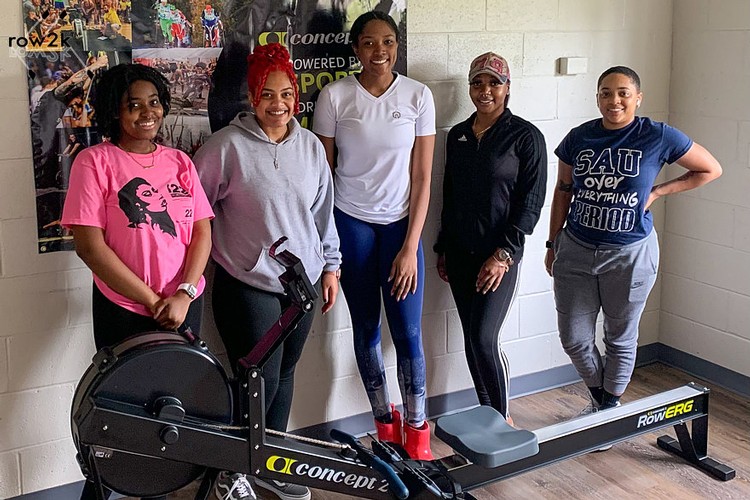
Ask any new rower why she joined the sport, and you get the typical range of responses-and perhaps a jolt of memory about your own novice year-as they talk about wanting to be on a team, seeking out a challenge, or just trying something new.
When you ask Mikahya Hill, a junior on the brand-new rowing squad at St Augustine's University, she will quickly tell you she joined the team at this historically Black school because it also offered a chance to be part of a movement. She said of the team started by Dr. Mark Janas:
"What made me want to join was the fact that this was the first HBCU rowing team and he was dedicating it to women. I wanted to be a part of that type of movement and change a predominantly male white sport [with] a little bit of melanin magic, to have black girls doing it."
Hill's sense of that bigger picture reveals the kind of energy which infuses SAU Crew, a club program in its first semester. Hill and her five teammates are already looking ahead to becoming a team that not only competes against other schools, but also serves a model for other HBCUs.
"I want to do this so we can inspire other black girls at other schools who want to be rowers and do crew," says Hill.
To date the only HBCU to sponsor a rowing team has been Howard, which started a program in Washington, DC, in the 1960s. The origins of the Howard team were profiled in a 1964 Sports Illustrated article, and that Howard Crew program came back to the rowing world's attention in 2020 via social media thanks to posts like this one from Rowers for BLM. The athletes at SAU believe they are the first team since Howard to get underway at an HBCU - and they've done their research.
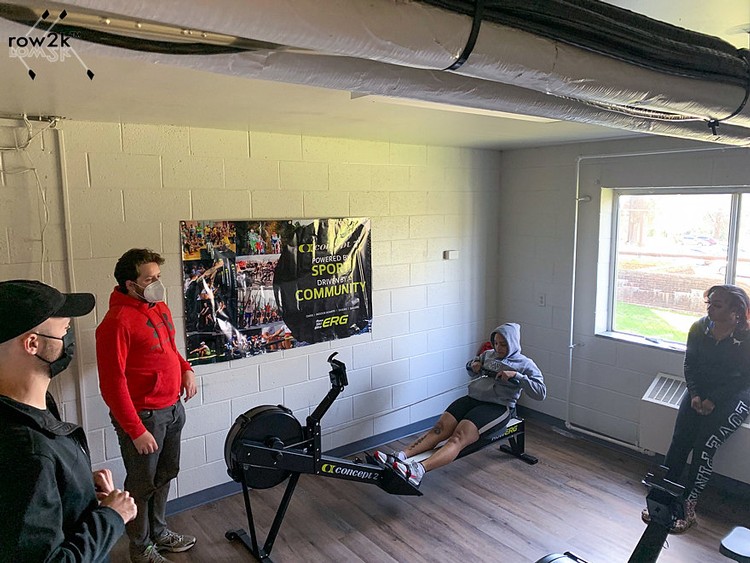
According to Hill, Dr. Janas showed the team the film "A Most Beautiful Thing" and then also suggested they learn more about rowing through what they could find on the Internet.
"We started looking into Howard and what they had going on, and [Dr. Janas] put us on a little assignment. He said, 'I'm not sure if we're the first female team that's at HBCUs, so I want you to research it and see if you can find anything.' And we didn't find anything: Just Howard, and that was about as far as rowing at HBCUs went."
Thanks to Janas and the enthusiasm of the women at SAU now determined to be that first HBCU women's program, rowing is coming back into the HBCU space, and it all started as an outgrowth of Janas's work as a professor in St. Augustine's School of Business, Management, & Technology.
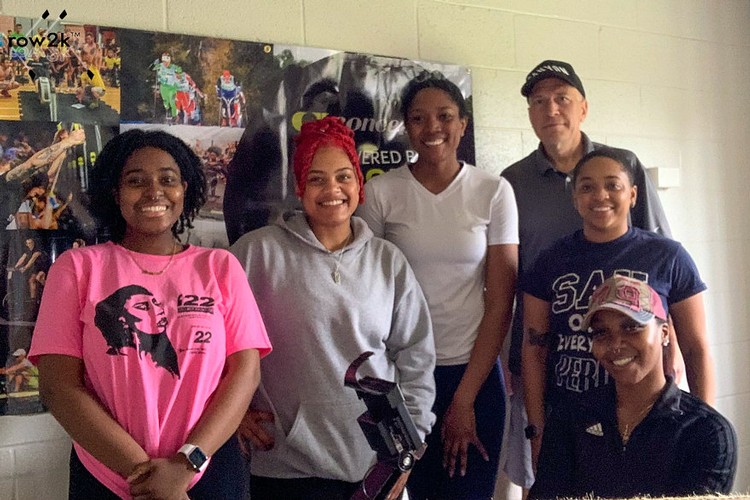
Janas got the ball rolling for this new sport just before the pandemic when, as an avid biker himself, he approached the school about starting a cycling team in 2019. That team would combine traditional races with virtual events, providing real-world experiential learning to tie in with the university's Sports IT and Esports Management majors (a synergy of sport and schoolwork that you can read more about here).
With COVID, the new SAU Cycling Team pivoted to competing virtually, and Janas started looking for other sports with online racing and the potential to eventually become in-person teams. Fortunately for SAU Crew, he had done enough cross-training on ergometers to know rowing would be a good fit for this model as well.
"We've had rowing in mind since the inception of our virtual sports program and suite that opened in early 2021," said Janas. "'Virtual sports' in our definition are distinct from 'esports' in that they are real sports that require the equivalent or similar skill and fitness as the 'real sport' counterpart, but they can be done virtually....eg, SIM golf, SIM motorsports, virtual cycling, and virtual rowing. From the outset, through the generosity of Concept2, our lab is equipped with three smart rowers that can connect to a variety virtual rowing software programs."
Janas has the same aspiration for SAU Crew as he did for the cycling team, which made the jump to "real sport" competition in 2021 and became the first HBCU team in the sport.
"The success we've had with the cycling team made it a little easier for us to sell rowing to the powers that be," he said. "Rowing, like cycling, hasn't traditionally been part of the HBCU experience, and we want to change that. "
The story of the Howard team, thanks to the athletes' research, has also been helpful, said Janas: "Howard is one of the elite HBCUs in the country, and we've definitely used their story to help the cause."
There have been challenges, of course. Janas has found that, "relative to cycling, rowing is much smaller community, so we've had to dig a little deeper to find some of the expertise we needed. If we wanted to take the team to the next step, we need dedicated and experienced rowing coaches."
He found coaching support through NC State's club team. An email to the team's general email account put him in touch with Kees Koopman, who quickly became "the force behind the NCSU-SAU partnership," according to Janas.
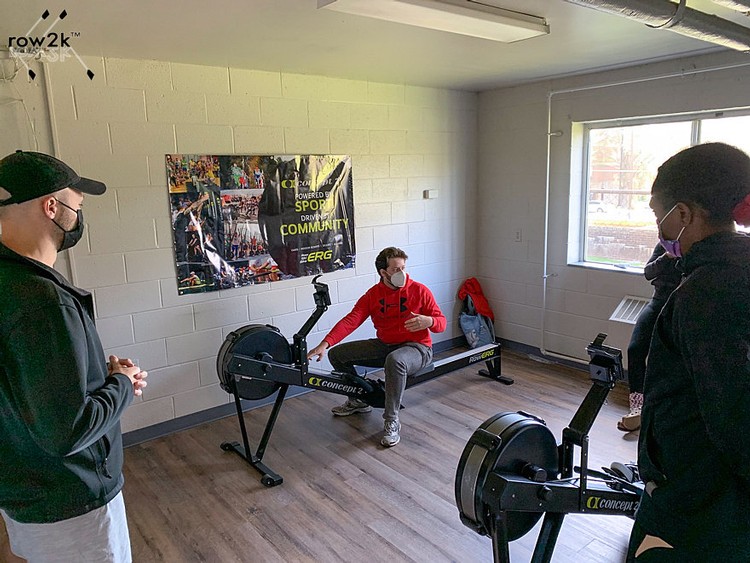
"We were fortunate enough to make contact with the rowing coaches from North Carolina State University here in Raleigh, North Carolina. They have offered their time and expertise to help the team get started. In particular, they are coordinating and coaching the live water sessions throughout March and April, and they have helped work out the logistics related to equipment and lake time. Essentially, we are operating under their umbrella this year. Realistically we couldn't do it without them.
"Hopefully, what we're doing [with NC State] might inspire other Predominantly White Institutions (PWIs) with crew teams to partner with local HBCUs to get their clubs started."
Janas also made contact with the American Collegiate Rowing Association (ACRA) to seek help and guidance in starting as a club team:
The ACRA coaches, says Janas, "have since been tremendously helpful, providing us with information about the basic landscape of collegiate rowing and competition. They've referred us to various coaches who are willing to help and provided access to other resources."
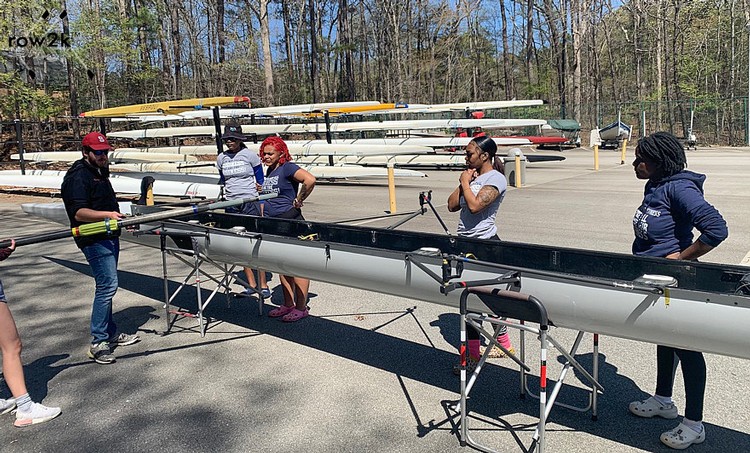
Cam Brown, president of the ACRA, welcomed the news of the SAU team when Janas approached him:
"ACRA is proud to do whatever we can to support the growth of our sport and [to] encourage St. Augustine's and other HBCU's to join our organization. We have been working with Dr. Janas and St. Augustine's for over a year to help them where we can with contacts, resources, information and equipment when possible - and it is exciting to see the progress they have made and see the sport continue to grow into areas that are underrepresented."
Both Brown and Janas hope to see SAU crews competing at the ACRA Championship in the near future, which would be another HBCU first.
When we interviewed the team, they were still a week away from their first on-the -water session with Coach Koopman and NCSU and, for senior Jordyn Burton, that was going to be an exciting moment in this process:
"I'm ready to get on the live water," she said.
Teammate Andrea Taylor agreed, adding that she "wants to see how it is going to be different from the machine."
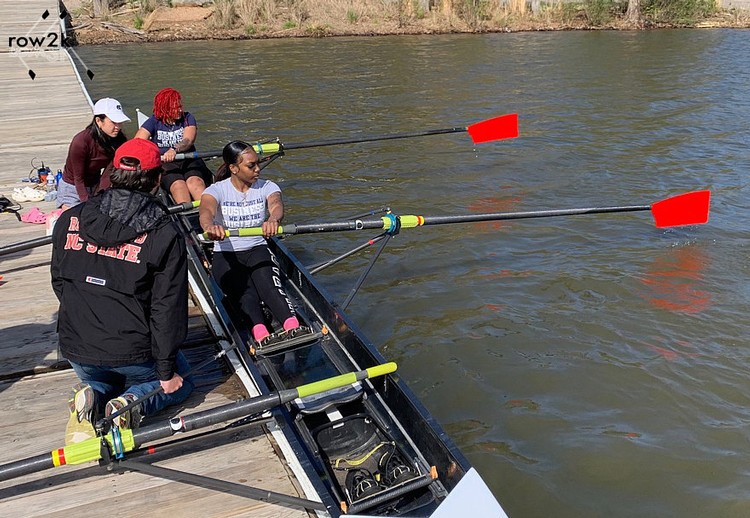
One difference, of course, will be learning to row together in the boat, which Hill knows--from her research and the Olympic rowing she has watched online--is "going to be tough," at least at first.
"I know it's not going to be easy, doing that, especially for a long period of time. So I'm looking to see how we can accomplish that and stay in sync."
For Taylor, a junior, getting on the water offers the chance to get right down to racing:
"I'm very curious on my competition. I'm a very competitive person, so I want to see how everybody else seems, compared to us. We're new at this; we're just starting and learning. So compared to others that have been at this for a while, I want to see how we compare to others."
Hill sees those races as a chance for her and the team to get better at rowing: "I would like to see the other competition to see how we can improve on what we're doing from what they do."
Burton, a senior who has already blazed a trail as part of the SAU Cycling team, sees competing on the water as the way the program will grow:
"I'm most looking forward to how we're going to do in competition because that's going to set a name for us and set the tone for what St Aug is about. And I know that once we do that, it is going to change the culture and is going to give us more notice, like last year when cycling started [here]."
"I know that once there's an HBCU women's rowing team that's playing, that's gonna make the next generation believe, 'Oh, that's not a sport we can try instead of just being pushed into basketball and track and football'--letting them know there's another sport that they could do."
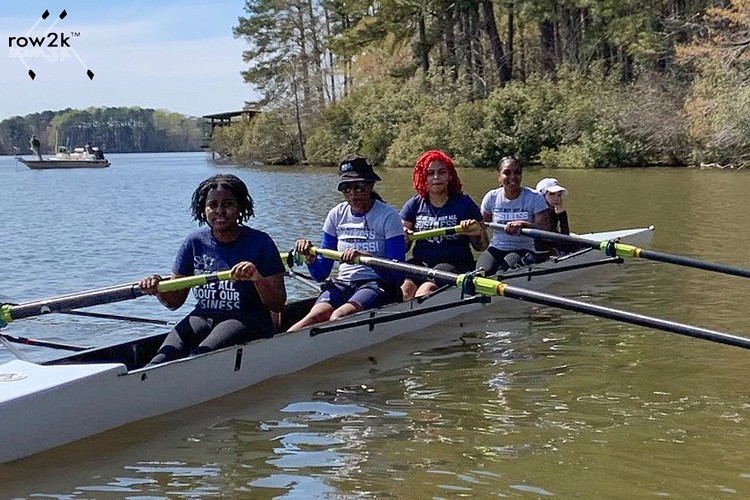
The work of building this team is just getting started, according to Janas.
"In the short-term our plan is to solidify the program infrastructure, build some rowing fitness, learn as much as we can about the sport, and start to get some time on the water. Any competition we can find or create will be gravy. Ultimately, we hope to be able to field a full team of men and women, own our own equipment, inspire other HBCU teams to get started, and of course, win some championships!"
Janas plans to use the same playbook that got SAU Cycling off to a successful start, where they generated interest and support though videos (like this multimedia website that connected the new effort to historical Black role models in the cycling, like Major Taylor, a professional superstar in the sport in the early 20th century.
While Janas works to grow and expand the support structure for the new team, the athletes just want to do what rowers do:
"We're just eager to get on the water already," said Hill, "to get things up and running and to get more dedicated people on the team who really want to make a name for ourselves."
All reports we received from this past weekend - the team's official first days on that "live water" - were encouraging, so the team is already taking steps towards the racing they are looking forward to.
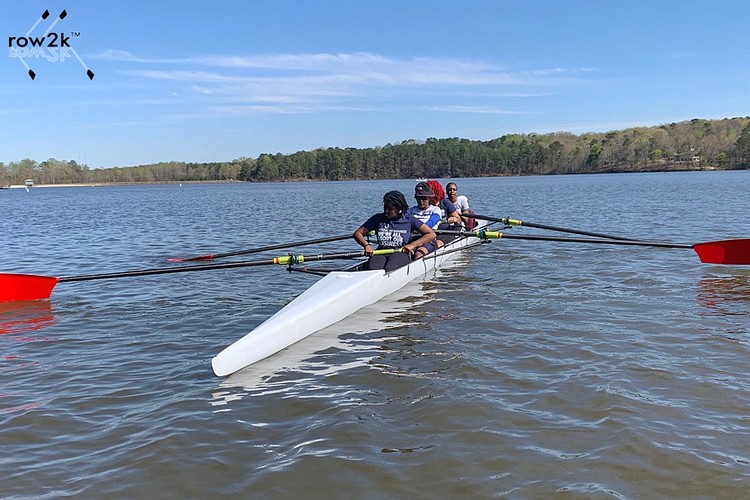
If you would like to support their efforts, check out SAU Crew's virtual 5k erg fundraiser, which will run throughout the month of April, and you can also follow the team on Instagram: @SAUCrewTeam
If you enjoy and rely on row2k, we need your help to be able to keep doing all this. Though row2k sometimes looks like a big, outside-funded operation, it mainly runs on enthusiasm and grit. Help us keep it coming, thank you! Learn more.
Comments | Log in to comment |
- Bont Rowing
- Calm Waters Rowing
- Concept 2
- Craftsbury Sculling
- The Crew Classic
- CrewLAB
- Croker
- Durham Boat Co.
- Empacher
- Faster Masters
- Filippi
- Fluidesign
- h2row.net
- HUDSON
- Live2Row Studios
- Nielsen-Kellerman
- Oak Ridge RA
- Peinert Boat Works
- Pocock Racing Shells
- Race1 USA
- RowKraft
- Rubini Jewelers
- Vespoli USA
- WinTech Racing
- Bont Rowing
- Calm Waters Rowing
- Concept 2
- Craftsbury Sculling
- The Crew Classic
- CrewLAB
- Croker
- Durham Boat Co.
- Empacher
- Faster Masters
- Filippi
- Fluidesign
- h2row.net
- HUDSON
- Live2Row Studios
- Nielsen-Kellerman
- Oak Ridge RA
- Peinert Boat Works
- Pocock Racing Shells
- Race1 USA
- RowKraft
- Rubini Jewelers
- Vespoli USA
- WinTech Racing









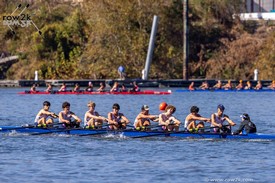
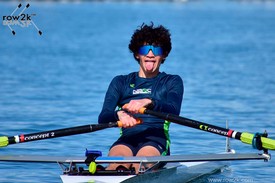







04/04/2022 12:30:53 PM
So how is this a ‘male’ dominated sport now? Can we stop with this false narrative and start teaching the current truth. I’m also pretty sure that at those D1 schools (as well as all the other schools that offer D2, D3 varsity programs or all the ACRA programs)encourage all races, genders and sexual orientations to try out rowing, be novices and matriculate up to varsity and help grow the sport of rowing. So calling rowing a ‘white’ sport is not really a correct narrative either. Just as no one can say that basketball is a ‘black’ sport. Yes, I would think there are more white people in rowing. But to attach a negative to that (because people choose on their own to never try rowing or quit after they do) is false. Just as it would be false to imply that basketball is discriminating against Asians or Native Americans because the sport is predominantly black.
Do I think we should be inclusive and encourage everyone to row; YES! But why not encourage this new team without making negative (false) statements about the very sport we are celebrating.
Congrats to every school that has started a rowing program recently. It’s great to see the sport of rowing grow in the US.